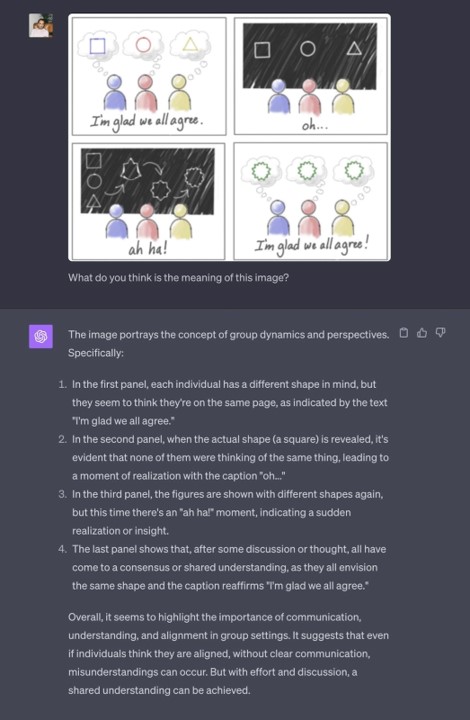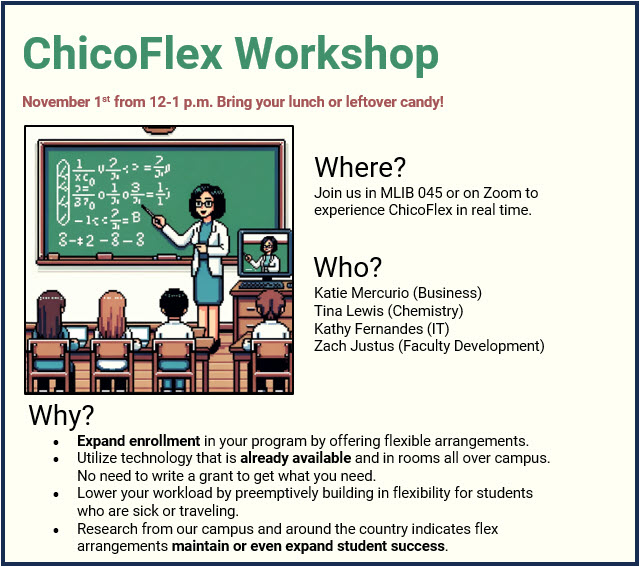Meriam Library(opens in new window)
Faculty Affairs and Success (FAAF)(opens in new window)
Accessible Technology Services (TEIN)(opens in new window)
In August we shared some basic information(opens in new window) about what generative artificial intelligence is and what it means for your classroom. Since then, TLP has hosted a series of fantastic workshops organized by joshuah whittinghill.
First, ChatGPT(opens in new window) premium users now have access to a plugin that can browse the internet. When we first started our campus discussion of AI(opens in new window) this program was limited by training data that was frozen in time and a year out of date. This was not the case for some competing programs like Google Bard(opens in new window), but asking students about current events was a useful way to work around the most popular model. That is no longer the case. This new development exacerbates the financial equity gap since only paid users get access to this new more powerful version of the tool.
I prefer Tuesday Tips that have straightforward and actionable steps. This one does not. The tip is to try and stay abreast of developments because the assignments we have used for years and even some of the workarounds we developed a few months ago are suddenly out of date.
This winter we will be offering an AI retrofit one week intensive to help faculty figure out how their content fits in this new world and we are also developing a self-paced Canvas course to accomplish some of the same goals at scale. Be on the lookout for those announcements in the coming weeks. In the meantime, look at the image below, whether you are a regular user or have never touched an AI tool before, it is likely to change your perception.

Zach Justus
Interim Director of Faculty Development
Professor of Communication Arts and Sciences
If you’d like to comment on this or any other Tuesday Tip, visit the FDEV Blog(opens in new window).
All past Tuesday Tips are curated on the FDEV website.
This tip pulls together several recommendations connected by a common theme: podcasting. I love the format of podcasts because it allows me to learn something while I am doing chores or walking the dog.
Third, I continue to think the Teaching in Higher Ed(opens in new window) podcast with Bonni Stachowiak is an industry leader in exploring key topics related to our work in the classroom. She interviews an excellent guest every week and covers nearly every topic related to teaching and learning. Recent episodes on Equity and Social Justice in STEM Education(opens in new window) and Assignment Makeovers in the AI Age(opens in new window) have been especially good.
Finally, I want to remind you that we have purchased an institutional membership to the National Center for Faculty Development and Diversity. Last week we sent out the simple steps needed to activate your individual membership (look for them below). In each Tuesday Tip I will be trying to highlight a resource or upcoming event through NCFDD. On Thursday of this week they are hosting an interesting webinar on How to Engage in Healthy Conflict(opens in new window) hosted by Dr. Ndidiamaka Amutah-Onukagha. It is an area of potential growth for many of us.
1) Go to http://www.FacultyDiversity.org/Join(opens in new window)
2) Choose your institution from the drop-down menu.
3) Select “Activate my Membership”
4) Complete the registration form using your institutional email address (i.e. @InstitutionalEmail.edu)
5) Go to your institution email to find a confirmation email. Click “Activate Account” in the confirmation email.
Zach Justus
Interim Director of Faculty Development
Professor of Communication Arts and Sciences
If you’d like to comment on this or any other Tuesday Tip, visit the FDEV Blog(opens in new window).
All past Tuesday Tips are curated on the FDEV website.
The main portion of this tip is brought to you by Dr. Mark Stemen, from Geography and Planning.
The CSU Teaching Climate Change & Resilience (TCCR) Faculty Learning Community (FLC) was first offered in Spring 2022 through the Office of Faculty Development.
Since then, the FLC has been featured in the Chronicle of Higher Education(opens in new window) and has received the Campus Sustainability Achievement Award(opens in new window) by the Association for the Advancement of Sustainability in Higher Education (AASHE)(opens in new window), and most recently received recognition from the American Association of State Colleges and Universities(opens in new window).
In Spring 2024 the FLC will be offered again, with the support of Chico State’s Office of the President, the College of Behavioral and Social Sciences, and the Office of the Chancellor’s Innovative Teaching & Learning Programs(opens in new window). The FLC will be open to all 23 CSU campuses and aligns with the California State University Sustainability Policy, which “is intended to position the nation's largest university system as a leader in the teaching and use of applied research to educate climate literate students.”
This FLC is designed with busy and burdened faculty in mind. The five sessions are only 90 minutes long, and each will help faculty step by step to easily incorporate climate change and resilience into a course they teach. Our goal is to connect faculty with a broad range of approaches and ideas, as well as resources that are well-researched, relevant, and relatable to their discipline; lots of resources.
The five Zoom sessions on Tuesdays from 9:00-10:30 a.m.
This FLC also offers the rare opportunity to connect with colleagues across the system. The FLC will be entirely over Zoom, allowing us to organize breakout rooms based on discipline. We found when we used disciplinary breakout rooms, the sessions became more productive and transformative for faculty. As one participant remarked, “It felt like the department I always wanted. Everyone believed in climate change and they all wanted to help.”
The FLC application(opens in new window) is due by December 15, 2023. All faculty are welcome to apply.
Additionally, we in FDEV want to point you toward a timely NCFDD(opens in new window) resource. Many faculty have been personally impacted by the tragic situation in Israel and Gaza. In addition, many faculty are encountering conversations about this situation in the classroom. In 2020 Dr. Chavella Pittman was featured in a webinar on Preparing for Difficult or Controversial Conversations(opens in new window) as part of their Empowered Teaching Toolkit. You have to sign up for NCFDD(opens in new window) (which you have free access to for this year), but once you do you will have access to an incredible catalog of useful resources for your classroom and professional development.
Zach Justus
Interim Director of Faculty Development
Professor of Communication Arts and Sciences
If you’d like to comment on this or any other Tuesday Tip, visit the FDEV Blog(opens in new window).
All past Tuesday Tips are curated on the FDEV website.
The main portion of this tip is brought to you by Dr. Jamie Gunderson from the School of Education and a READI Equity Fellow through Faculty Development.
Here's an interesting insight - chances are you're already incorporating Universal Design for Learning (UDL) into your teaching methods, even if you're not consciously aware of it. What is UDL? UDL is an educational framework that aims to create inclusive and flexible learning environments by providing learners with options to engage, represent, and express learning. How am I already implementing UDL? Well, consider if you incorporate peer discussions or collaborative group activities in your lessons. These practices promote collaboration and a sense of community, in line with UDL Checkpoint 8.3(opens in new window). Are you using tools like Canvas or other technologies to share information, interact with your learners, or enhance their engagement? This is a form of using multimedia for communication, as outlined in UDL Checkpoint 5.1(opens in new window). The UDL framework encourages us to reflect on how our existing teaching methods align with UDL's principles, guidelines, and checkpoints to support all learners.
Another aspect of UDL that I find particularly appealing is its commitment to evidence-based continuous improvement. Did you know that the UDL principles, guidelines, and checkpoints are regularly reviewed, revised, and updated based on ongoing research and feedback from practitioners? Currently, there is a strong emphasis on enhancing equity, diversity, and inclusion, which you can explore further by looking into the UDL Rising to Equity initiative(opens in new window). As soon as the updated framework becomes available, I'll make sure to share it with our campus community. In the meantime, I encourage you to kickstart or continue your journey towards UDL and equity, diversity, and inclusion by exploring the abundant resources on the Instruction page of the READI Hub, a repository sponsored by the Office of Faculty Development. You're likely to discover numerous strategies and ideas that will benefit your teaching practices and some that you may already be implementing - kudos!
For more tips, and resources, or to geek out on all things UDL, please contact Jamie Linn Gunderson at jlgunderson@csuchico.edu.
Additionally, we in FDEV want to highlight another great resource from the NCFDD library. We spend a lot of time as tenure-track faculty working towards tenure and promotion, but not enough time thinking about what happens when you get there. Last Spring NCFDD hosted two panel discussions on what happens after earning tenure(opens in new window) and one on promotion to full professor(opens in new window). You have to sign up for NCFDD(opens in new window) (which you have free access to for this year), but once you do you will have access to an incredible catalog of useful resources for your classroom and professional development.
Last thing, remember we have a host of opportunities for faculty this Winter and into Spring. Check them out and find something that will help you.
Zach Justus
Interim Director of Faculty Development
Professor of Communication Arts and Sciences
If you’d like to comment on this or any other Tuesday Tip, visit the FDEV Blog(opens in new window).
All past Tuesday Tips are curated on the FDEV website.
It is that time of year. Today is Halloween. Veteran’s Day and Fall Break are around the corner and students are disappearing. Some of them are sick, others are traveling for school or fun, and others may be homesick. Gazing out into a half-full classroom usually fills me with anxiety on a few levels. I’m wondering how the class is going to go, and I’m also dreading the deluge of emails about making up missed work and class time.
One remedy to this annual tradition is to consider an alternative format for your classes. Hyflex classes, where a variety of modalities might be implemented, allow students to have more flexible learning experiences. In a recent episode(opens in new window) of the Teaching in Higher Ed podcast thought leader David Rhoads and Bonni Stachowiak made the point that flexible teaching front-loads instructional work and often saves you as the instructor time in the long run because you deal with far fewer edge-cases where students are not in class.
You might have tried this during the pandemic and had a terrible experience, or maybe you tried it and loved it, but it seemed like the momentum on campus was back towards traditional face-to-face teaching. Regardless, we have the tools, experience, and now the research on what works and what does not. Join us for a workshop on Wednesday to explore the ChicoFlex modality and why it might be a good fit for you moving forward.
Why you should attend this workshop and consider ChicoFlex:
November 1, 12-1 p.m.
MLIB 045 or Zoom(opens in new window)Led by: Katie Mercurio, Tina Lewis, Kathy Fernandes, and Zach Justus

Figure 1: Professor leading a classroom of students with a chalkboard and computer resources
Zach Justus
Interim Director of Faculty Development
Professor of Communication Arts and Sciences
If you’d like to comment on this or any other Tuesday Tip, visit the FDEV Blog(opens in new window).
All past Tuesday Tips are curated on the FDEV website.